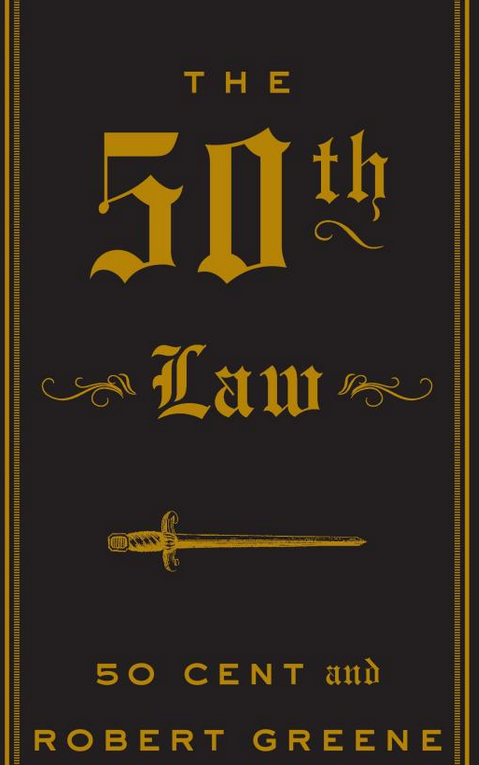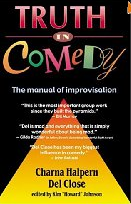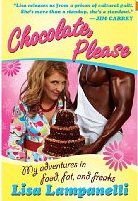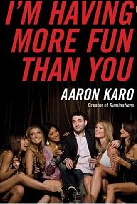I just finished reading The 50th Law by Robert Greene and 50 Cent. It’s a strategic book about being fearless and I found a lot of the quotes apply to stand up. I highly recommend this book (especially the last 150 pages) to any comedian or anyone looking for ways to improve themselves, as well as Robert Greene’s other strategy books The 48 Laws of Power and The 33 Strategies of War.
I’ve bolded the quotes I feel most important and applicable to comedy.
 “Your fears are a kind of prison that confines you within a limited range of action. The less you fear, the more power you will have and the more fully you will live.” (x)
“Your fears are a kind of prison that confines you within a limited range of action. The less you fear, the more power you will have and the more fully you will live.” (x)
“The greatest fear people have is that of being themselves. They want to be 50 Cent or someone else. They do what everyone else does even if it doesn’t fit where and who they are. But you get nowhere that way; your energy is weak and no one pays attention to you. You’re running away from the one thing that you own – what makes you different.” (18) (50 Cent quote)
“Dependency is a habit that is so easy to acquire. We live in a culture that offers you all kinds of crutches – experts to turn to, drugs to cure any psychological unease, mild pleasures to help pass or kill time, jobs to keep you just above water. It is hard to resist. But once you give in, it is like a prison you enter that you cannot ever leave.” (59)
“A lower paying position that offers more room to make decisions and carve out little empires is infinitely preferable to something that pays well but constricts your movements.” (63)
“The only way to gain self-reliance or any power is through great effort and practice. And this effort should not be seen as something ugly or dull; it is the process of gaining power over yourself that is the most satisfying of all, knowing that step-by-step you are elevating yourself above the dependant masses.” (68)
“Even the worst shit that happens to you can be converted into gold if you are clever enough.” (73)
“Every negative is a positive. The bad things that happen to me, I somehow make them good. That means you can’t do anything to hurt me.” (75) (50 Cent quote)
“Negative energy that comes at you in some form is energy that can be turned around – to defeat an opponent and lift you up.” (86)
“If bad publicity comes your way, think of it as a form of negative attention that you can easily reframe for your purposes. You can seem contrite or rebellious, whatever will stir up your base. If you ignore it, you look guilty. If you fight it, you seem defensive. If you go with it and channel it in your direction, you have turned it into an opportunity for positive attention. In general, obstacles force your mind to focus and find ways around them. They heighten your mental powers and should be welcomed.” (86)
“Move before you think you are ready. It is as if you are making it a little more difficult for yourself, deliberately creating obstacles in your path… When you feel that you must work harder to get to your goal because you are not quite prepared, you are more alert and inventive. This venture has to succeed and so it will.” (87)
“Remember: as Napoleon said, the moral is to the physical as three to one – meaning the motivation and energy levels you or your army bring to the encounter have three times as much weight as your physical resources. With energy and high morale, a human can overcome almost any obstacle and create opportunity out of nothing.” (88)
“What you must do instead is accept the fact that all events occur for a reason, and that it is within your capacity to see this reason as positive.” (90)
“If anybody wants to keep creating they have to be about change.” (93) (Miles Davis quote)
“By a paradoxical law of human nature, trying to please people less will make them more likely in the long run to respect and treat you better.” (132)
“Any titles, money, or privilege you inherit are actually hindrances. They delude you into believing you are owed respect.” (159)
“Only your actions can prove your worth.” (159)
“Your own level of excitement and self-belief will convince people that you know where you are going and should be followed.” (168)
“The public is never wrong. When people don’t respond to what you do, they’re telling you something loud and clear. You’re just not listening.” (183) (50 Cent quote)
“If you feel superior at all, part of some chosen elite, then this seeps out in the work. It is conveyed in the tone and mood. It feels patronizing.” (191)
“To interact closely with the public and get its feedback might mean having to adjust your “brilliant” ideas, your preconceived notions.” (191)
“In this day and age, to reach people you must have access to their inner lives – their frustrations, aspirations, resentments. To do so, you must crush as much distance as possible between you and your audience. You enter their spirit and absorb it from within.” (194)
“Any kind of group tends to close itself off from the outside world. It is easier to operate this way. From within this bubble, people will delude themselves into thinking they have insight into how their audience or public feels.” (196)
“The goal in connecting to the public is not to please everyone or to spread yourself out to the widest possible audience. Communication is a power of intensity, not extensity and numbers. In trying to widen your appeal, you will substitute quantity for quality and will pay a price. You have a base of power – a group of people, small or large, which identifies with you.” (198)
“Our egos can inflate to any size. But when we produce something that fails to have the expected impact, we are suddenly faced with a limit – we are not as brilliant or skilled as we had imagined. In such a case, our tendency is to blame others for not understanding it or getting gin our way. Our egos are bruised and delicate – criticism from the outside seems like a personal attack, which we cannot endure.” (198-199)
“Beware of feedback from friends whose judgments could be tainted by feelings of envy or the need to flatter.” (199)
“When your work does not communicate with others, consider it your own fault – you did not make your ideas clear enough and you failed to connect with your audience emotionally. This will spare you any bitterness or anger that might come from people’s critiques. You are simply perfecting your work through the social mirror.” (199)
If you like the quotes, buy and read the book here.




